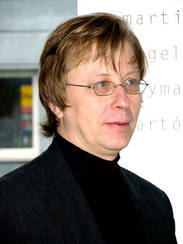
- Foto by Eric Marinitsch, copyright by Universal Edition
Georg Friedrich Haas, composition
"I don’t trust relationships that become apparent only in the score and not through the immediate sensual perception. I hope that in my music, intuition and rational control are balanced." (Georg Friedrich Haas)
In spite of all the contrasts that can be felt in the music of Georg Friedrich Haas, it is the sensual stimulus of the sound, and an interest in a vital instrumental tone that forms a central focus for the composer, without contradicting the more conceptual aspects of his compositions. Born in Graz in 1953, he pursued his studies both in his home town with Gösta Neuwirth and Ivan Eröd, and later in Vienna with Friedrich Cerha. Already as a student, he investigated different concepts of microtonal systems, consulting the oeuvre of composers like Wyschnegradsky, Hába, Tenney, Nono and Grisey.
Microtonality thus became an important denominator in his work early on, as in his chamber opera "Nacht" ("Night") which was premiered with great success at the Bregenz Festival in 1996. After initial experiments with quarter tones (for example in his "3 Hommages for one performer on two pianos tuned a quarter tone apart") he began in the mid-eighties to explore sound as a set of iridescent intermediate values. In pieces such as his "First String Quartet" (1997) he worked intensively with overtone constellations – a process that culminated in his ensemble piece "in vain" (2000).
Before long, Georg Friedrich Haas’ works were being performed at the most prominent contemporary music festivals. At the Salzburg Festival 1999, he gained much attention as the featured Next Generation composer. The Bregenz Festival commissioned another chamber opera ("Die schöne Wunde") which was premiered in 2003 by Klangforum Wien. In the same year, the SWR Radio Symphony Orchestra performed his work "Natures mortes" in Donaueschingen, where in 2006 "Hyperion. Concerto for light and orchestra" also met with great acclaim. In 2004, he was invited to teach at the Darmstadt International Summer Courses for New Music, which he had frequently attended as a student.
Many renowned symphony orchestras have performed works by Georg Friedrich Haas, including the Bavarian Radio Symphony Orchestra and Vienna Philharmonic ("Concerto for cello and large orchestra", 2004), Mozarteum Orchestra Salzburg ("Sieben Klangräume" for choir and orchestra, 2005), Cleveland Orchestra ("Poème" for large orchestra, 2006), Munich Philharmonic ("Bruchstück" for large orchestra, 2007), Vienna Radio Symphony Orchestra ("Concerto for piano and orchestra", 2007), WDR Radio Symphony Orchestra Cologne ("Concerto for baritone saxophone and orchestra", 2008) and the Gewandhausorchester Leipzig ("Traum in des Sommers Nacht", 2009).
One of the latest works of Georg Friedrich Haas, his opera "Melancholia", has been performed at several opera houses following its highly successful premiere at Opéra National de Paris with Klangforum Wien in 2008.
Georg Friedrich Haas has received numerous composition awards and was honoured with the Grand Austrian State Prize in 2007.
Georg Friedrich Haas will be teaching and present at impuls from February 9th to 15th.
